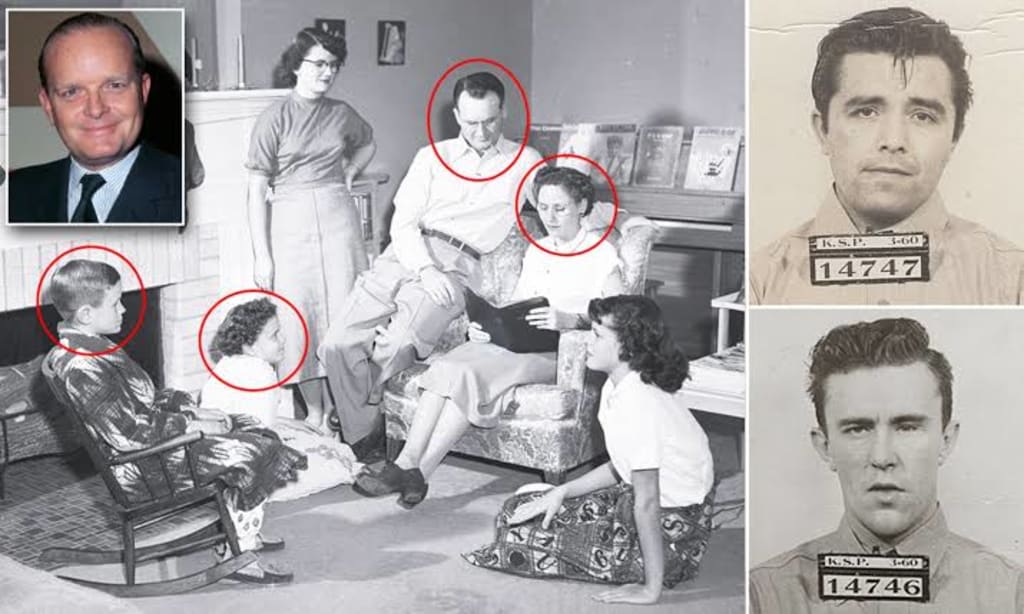The Clutter Family Murders
The Clutter Family Murders (1959): Made famous by Truman Capote's book "In Cold Blood," this case involved the murders of the Clutter family in Holcomb, Kansas. The senseless killings led to widespread fear in the community and renewed debates about the death penalty.

The Clutter Family Murders of 1959 in Holcomb, Kansas, is a tragic and chilling true crime case that shook the nation. The heinous killings of the Clutter family, immortalized by Truman Capote's book "In Cold Blood," left the small town in a state of shock and fear. The brutal and senseless violence perpetrated by Perry Smith and Richard "Dick" Hickock sparked widespread debates about the death penalty and the ethics of true crime writing. Decades later, the impact of these murders continues to resonate, serving as a haunting reminder of the complexities of human nature and the enduring consequences of violence.
The Clutter family, comprising Herb Clutter, his wife Bonnie, and their four children - Nancy, Kenyon, Beverly, and Nancy - were respected and prosperous members of the Holcomb community. Herb was a successful farmer, and the family was known for their warmth and close-knit ties.
On the night of November 15, 1959, Perry Smith and Dick Hickock, two ex-convicts, entered the Clutter home with the intention of robbing the family. Acting on an unfounded tip, they believed that Herb Clutter kept a large sum of money in the house. In a shocking display of brutality, Perry and Dick bound and gagged the family members before taking their lives, leaving a grisly crime scene that left Holcomb in a state of disbelief and fear.
The investigation into the Clutter family murders was arduous, and initial leads proved fruitless. However, a breakthrough came when authorities received a tip about Perry Smith and Dick Hickock's possible involvement. The two had been in Kansas around the time of the murders, raising suspicions due to their criminal histories.
In December 1959, Perry and Dick were arrested in Las Vegas, Nevada, for unrelated crimes. While in custody, they were interrogated about the Clutter family murders, eventually confessing to the heinous crimes.
The trial of Perry Smith and Dick Hickock garnered national attention, with Truman Capote closely following the case. His book "In Cold Blood" became a seminal work in the true crime genre, offering a detailed account of the murders and their aftermath. The trial also reignited debates about the death penalty, with some advocating for its swift application as a form of justice and deterrence, while others questioned its efficacy and potential for wrongful convictions.
Perry Smith and Dick Hickock were found guilty and sentenced to death by hanging. Their executions sparked further controversy and soul-searching about the ethics of capital punishment. Truman Capote's book added another layer of complexity to the case, exploring the emotional toll such works can have on the victims' families and the potential exploitation of tragedy for literary success.
The Clutter Family Murders left an enduring impact on the town of Holcomb, where the once-tranquil community was forever haunted by the specter of violence. The profound sense of vulnerability and fear persisted among its residents, with many struggling to come to terms with the tragedy that had unfolded in their midst.
The case also spurred debates about the death penalty, with proponents advocating for its use as a form of justice and retribution, while opponents questioned its morality and potential for irreversible errors. The Clutter Family Murders forced society to confront the complex moral and ethical questions surrounding capital punishment.
Decades later, the impact of the Clutter Family Murders continues to resonate, reminding us of the enduring consequences of violence and the complexities of human behavior. The case serves as a haunting reminder of the profound and lasting impact of crime on communities and the importance of seeking justice while balancing sensitivity and empathy.
As we reflect on this chilling tale, we are reminded of the enduring power of true crime writing and its potential to bring awareness to tragedies. However, we must also recognize the ethical responsibility that comes with delving into such sensitive and painful subjects. The Clutter Family Murders remain a cautionary tale, urging us to approach true crime narratives with empathy and respect for the victims and their families.
In conclusion, the Clutter Family Murders of 1959 stands as a haunting chapter in American crime history. The brutal killing of an innocent family left a small community reeling in fear and devastation. Truman Capote's book "In Cold Blood" brought national attention to the tragedy and sparked debates about the death penalty and true crime writing ethics. Decades later, the case serves as a haunting reminder of the complexities of human nature and the importance of seeking justice while remaining mindful of the enduring consequences of violence. The Clutter Family Murders continue to be a powerful testament to the far-reaching impact of crime and the need for empathy and understanding in the pursuit of justice.
About the Creator
Reader insights
Nice work
Very well written. Keep up the good work!
Top insights
Eye opening
Niche topic & fresh perspectives
On-point and relevant
Writing reflected the title & theme





Comments (1)
It feels wrong to "like" a story about murders. That said, I appreciate that you've written about true crime and how carefully, intentionally, and thoughtfully you've laid out the details. Thank you for bringing the victims' voices forward.